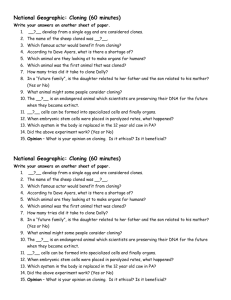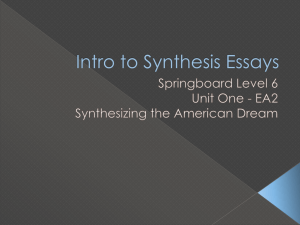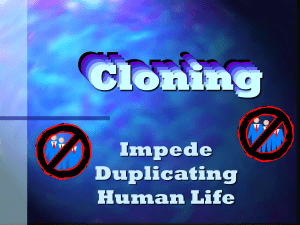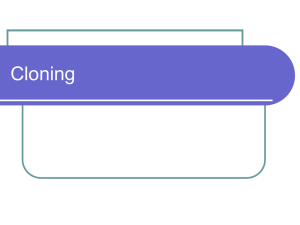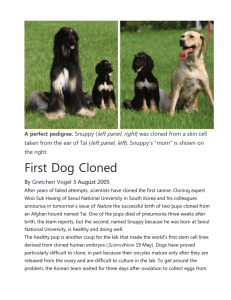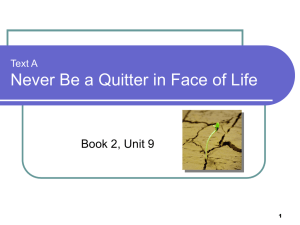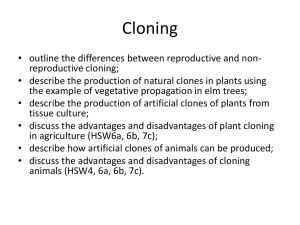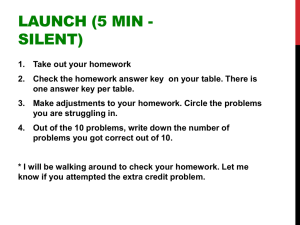New Horizon College English Book
advertisement
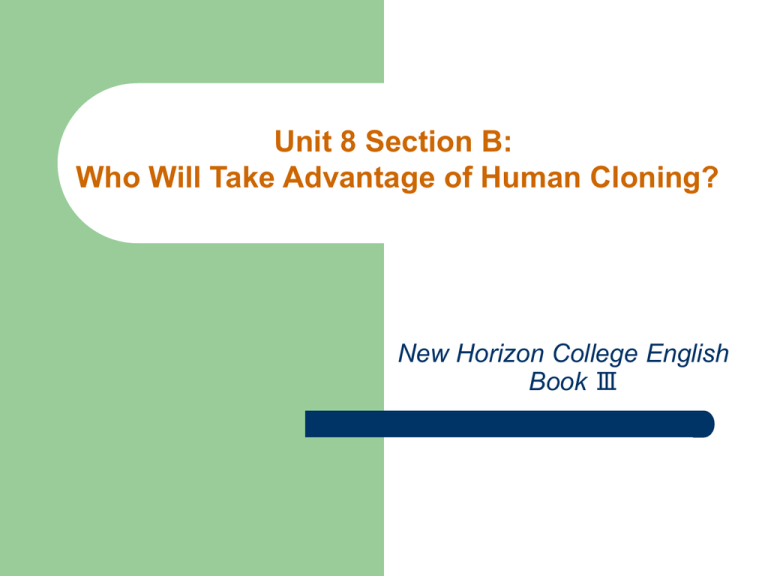
Unit 8 Section B: Who Will Take Advantage of Human Cloning? New Horizon College English Book Ⅲ Contents I. Reading skill II. Fast reading III. Structure of the text IV. Important Words V. Detailed study of Text VI. Exercises I. Reading skill -- Identifying the Writer’s Purpose 1.How to identify the writer’s purpose? Informational writing features facts and evidence, not opinions or value judgments. The writer may present theories to explain the facts, but the aim is not so much to change the reader’s opinion as it is to clarify a question or situation. Persuasive writing features emotional appeals, opinions and arguments, rhetorical questions, evaluating language and/ or judgmental language. Texts written mainly to entertain can, of course, be very varied---but they often they often use rather informal language, simple sentence structure, dialogs, puns and/ or figures of speech. 2.Practice Is the text informational, persuasive or meant mainly to entertain? Study the title carefully. What does the title tell you about the content of the text? The title is actually a question. By using a question as a title, the author tries his best to attract the reader’s attention. Obviously, it’s about the possibility or even legality of human cloning. The author gives us a thorough analysis as to who will take advantage of human cloning. Is the language the author uses rather formal and serious? Informal and light-hearted? Or strongly emotional? The language is formal and serious. Besides, it is emotional. The evidence for this is the repeated employment of rhetorical questions. How many questions are there in the text? What are they? Altogether, there are seven questions, including the one in the title. Of the seven, four are rhetorical questions. They appear respectively at the end of Para.2, Para.3, Para.4, and at the beginning of Para.6. What’s the function of the rhetorical questions? Rhetorical questions are mainly intended to stir up the listeners’ or readers’ emotions, to put them off guard, making them ready to accept the speaker’s or writer’s opinion. Rhetorically, this is called emotional appeal. By using rhetorical questions four times, the author of this text is appealing to the readers to accept her idea “don’t just say no to human cloning”. With all the above in view, we can see that the text is persuasive. Back II. Fast reading 1. Much of the moral opposition towards human cloning is due to the fact that it will fundamentally change our conception of biology. F 2. Trained scientists and other experts are comparatively able to view the cloning issue more logically. F 3. According to the author, clones deserve the same rights and dignity as we do in society and therefore should be treated equally. T 4. It’s morally wrong for parents to bear their second child as an organ donor. F 5. Human cloning is not the same case an Nazis’ crime. People will use their own judgement. T 6. A cloned child is a lesser being, therefore won’t be loved by the people to whom he is related. F 7. Infertile couples should not be deprived of the right to clone a child although they have other our options. T 8. Human cloning, if well under control, can offer wu benefit we certainly deserve. T Back III. Structure of the text Part 1(para.1): The cloned sheep brings a question: can we clone human being? Part2 (paras.2-5): There could be some advantages and disadvantages in cloned human being. Part3 (paras.6): Having no suitable law, the research and application can be stopped for a while, but can’t be prohibited. Back IV. Important Words preface n&v a) 前奏, 序幕 e.g. The talks were a preface to peace. 这次谈话是和平的前奏. b) 序言, 引言 e.g. The famous writer wrote a preface to this book. 一位著名的作家为这本书写了前言. Note: preface 做动词时表示 以…开始, 搭配为preface…with sth, preface…by doing sth e.g. He prefaced his speech with an amusing story. 他以一个有趣的故事作为开场白. constitutes v a) 是, 构成 e.g. Your attitude constituted a direct challenge to his authority. 你的态度对他的权威构成直接威胁. Wars constitute a threat to peace. 战争对和平构成威胁. b) 组成,构成 e.g. 12 months constitute a year. 一年12个月. ▲ consist of 由…组成 e.g. A year consists of 12 months. 一年12个月. gross adj a) 明显错误 e.g. There is gross inequality between the rich and the poor. 贫富差距存在明显不平衡 b) 总的,总共 e.g. gross profit毛利 gross domestic product (GDP) 国内生产总值 applicable adj Note: be applicable to 适用于 e.g. The rule is applicable to the case. 这条规则适用于这件事情。 This is an applicable new system. 这是个切实可行的新系统。 【派生】apply to 适用 applicability 适用性,(可)应用性 panic n e.g. Panic spread through the crowd. 人群慌乱起来。 be seized/struck with (a) panic 惊慌失措 get in/into a panic 变得惊慌起来 at the prospect that/of… 考虑到 e.g. We canceled the sports meeting at the prospect that it will rain tomorrow. 考虑到明天会下雨我们取消了运动会。 resign oneself to sth decide that one has to accept a difficult or unpleasant situation e.g. You must resign yourselves to waiting a bit longer. 你得稍等一会儿。 Note: resign oneself to one’s fate 听天由命 Back V. Detailed study of Text 1. last week’s news that scientists had cloned a sheep sent academics and the public into a panic at the prospect that humans might be next. (Para. 1) 上星期的新闻报道说,科学家已经克隆了一只绵羊.这一消息引起恶劣学 术界和公众的恐慌,他们预想下一个就轮到人类了. sent into : make…enter a certain state e.g. The movement of the train sent me into sleep. 火车的震动使我入眠。 The remark sent him into laughter. 一席话让他大笑。 2. Yet much of the moral opposition seems also to grow out of an automatic, unthinking disgust. (Para. 1) Meaning: most people find human cloning morally disgusting and so it seems they object to it naturally and without much thinking about it. grow out of: have sth as a source e.g. The plan grew out of mutual trust. 这个计划源于共同的信任。 Back VI. Exercises Finish the rest exercises on page 236, Book 3 The End
